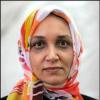Leila Aboulela

Leila Aboulela
Leila Aboulela, Arabic 'ليلى ابوالعلا' is a Sudanese writer who writes in English. Her latest novel, The Kindness of Enemies is inspired by the life of Imam Shamil, who united the tribes of the Caucasus to fight against Russian Imperial expansion. Leila's novel Lyrics Alley, was Fiction Winner of the Scottish Book Awards and short-listed for a Regional Commonwealth Writers Prize. She is also the author of the novels The Translatorand Minaret. All three novels were long-listed for the Orange...
NationalitySudanese
ProfessionWriter
CountrySudan
Many Arabic/Islamic words have now entered the English dictionary, such as haj, hijab, Eid, etc., and I no longer need to put them in italics or explain them.
When you write about a Muslim woman, like I did with my previous novels - 'Minaret', for example, which is about a woman who starts to wear the hijab - it sets all the alarm bells ringing.
My mum and dad were speaking all the time about, 'In Sudan we do this,' and 'In Egypt we do that,' so I was very aware of cultural differences. I was confused growing up; it gave me a feeling of being an outsider watching others. But I think this is good for a writer.
My grandmother studied medicine in the Forties, which was very rare in Egypt, and my mother was a university professor, so my idea of religion wasn't about a woman not working or having to dress in a certain way; it was more to do with the faith.
I'm concerned that Islam has not just been politicised but that it's becoming an identity. This is like turning religion into a football match; it's a distraction from the real thing.
I write fiction that reflects Islamic logic: fictional worlds where cause and effect are governed by Muslim rationale. However, my characters do not necessarily behave as 'good' Muslims; they are not ideals or role models.
I was 24 years old and stuck in a strange place with two boisterous little boys, and my husband was working offshore on the oil rigs. It was a life for which I wasn't prepared.
I started creative writing classes at Aberdeen Central Library, and the writer-in-residence there, Todd McEwen, encouraged me a great deal. He showed my stories to his editor, and I thought that was just what happened to everyone who took his classes!
I grew up in a very westernised environment and went to a private American school. But my personality was shy and quiet, and I wanted to wear the hijab but didn't have the courage, as I knew my friends would talk me out of it.
When I was growing up, we spoke Egyptian, we ate Egyptian food, we had other Egyptian friends. It was my father's preference.
That's what religion teaches: that life is a temporary thing which is going to dissolve one day.
Sudan is not Arab enough for Arabs and not African enough for Africans.
My father married out of the family. I also married outside the family.
My characters are not role-model Muslims, but they struggle to make choices using Muslim logic.